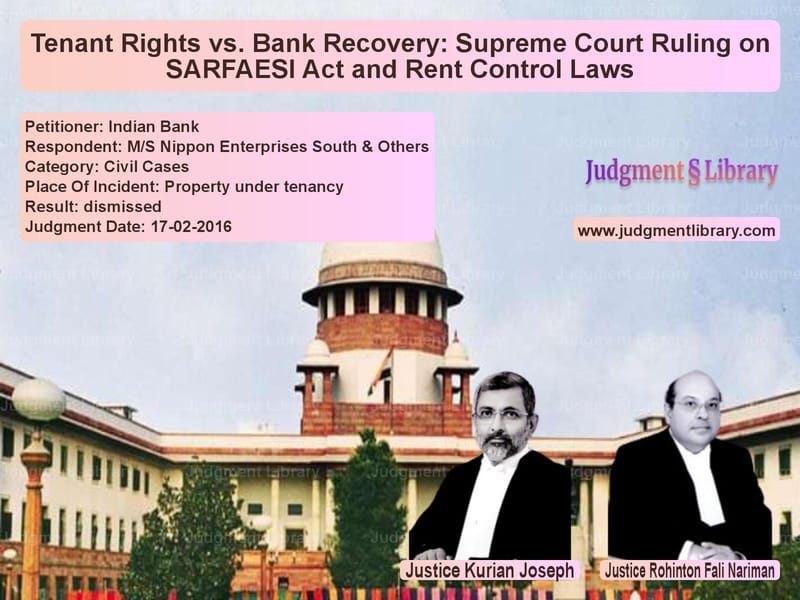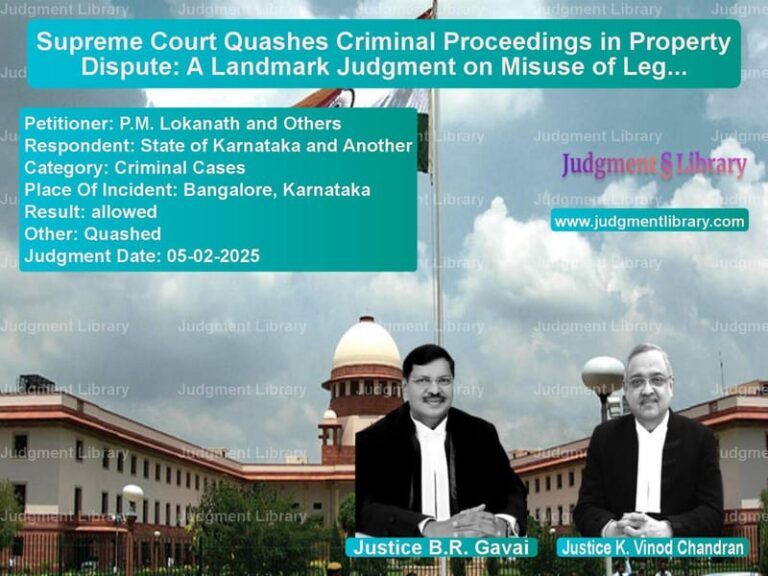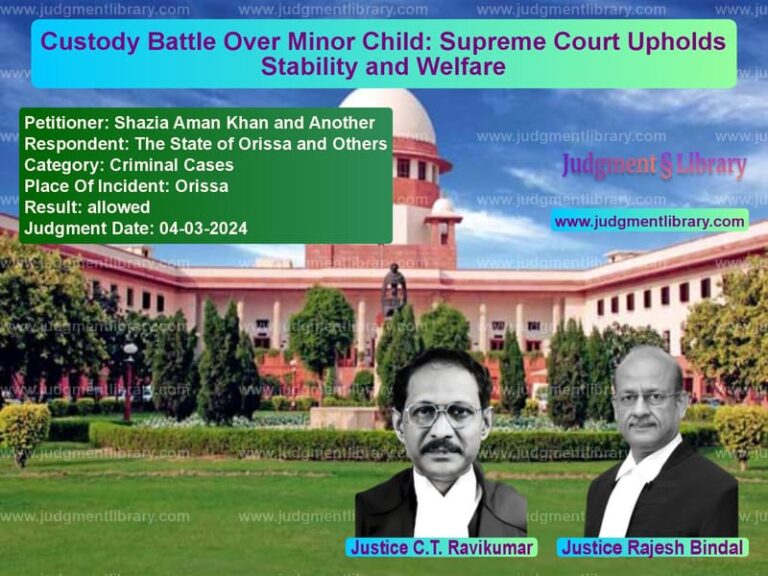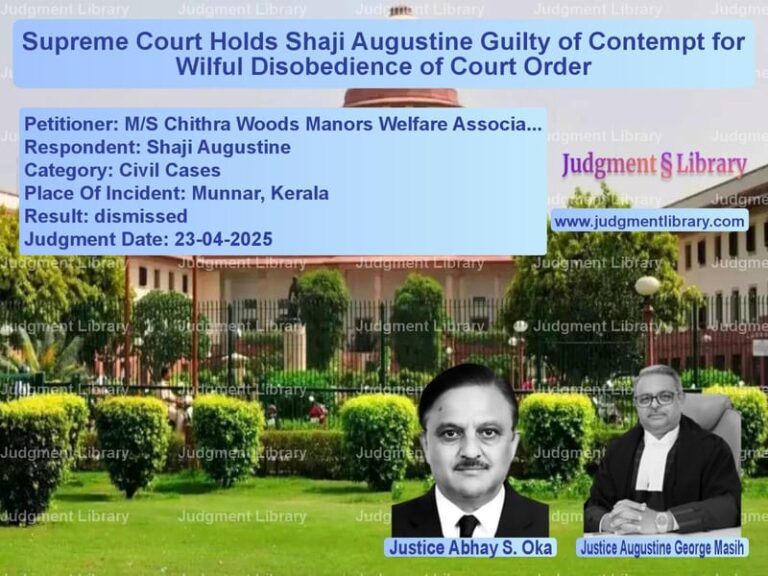Tenant Rights vs. Bank Recovery: Supreme Court Ruling on SARFAESI Act and Rent Control Laws
The Supreme Court of India recently ruled in the case of Indian Bank vs. M/S Nippon Enterprises South & Others, addressing the conflict between tenants’ rights under rent control laws and banks’ rights under the SARFAESI Act for recovering secured assets. The case highlights a crucial legal question: Can banks evict tenants occupying secured properties without following proper legal procedures?
This judgment has significant implications for both tenants and financial institutions, clarifying the extent of banks’ powers in enforcing security interests while ensuring that tenants’ legal protections are upheld.
Background of the Case
The dispute arose when Indian Bank, the appellant, sought to recover secured assets from the premises occupied by M/S Nippon Enterprises South & Others. The bank had successfully invoked proceedings under the Securitisation and Reconstruction of Financial Assets and Enforcement of Security Interest (SARFAESI) Act, 2002, against the defaulting borrower. However, the premises in question were occupied by a tenant, raising the issue of whether the tenant could be evicted through SARFAESI proceedings.
The key question before the Supreme Court was:
- Whether a bank that has won SARFAESI proceedings against a borrower can automatically evict a tenant occupying the secured premises.
Arguments Presented
Petitioner’s (Indian Bank) Arguments
The bank presented the following key arguments in favor of evicting the tenant:
- The secured asset had been mortgaged to the bank as collateral, and the borrower had defaulted on loan repayments.
- The SARFAESI Act grants the bank the authority to seize and sell the property without interference.
- The presence of a tenant should not prevent the bank from enforcing its security interest.
- Allowing tenants to continue occupying mortgaged properties would undermine the bank’s ability to recover debts.
Respondent’s (M/S Nippon Enterprises South & Others) Arguments
The tenant opposed the bank’s claim, arguing:
- The tenancy was legally created, and they had been occupying the premises lawfully.
- The Rent Control Act protects tenants from arbitrary eviction and ensures due process.
- The SARFAESI Act should not override rent control laws, as tenants have legal rights independent of the borrower’s default.
- Eviction must be carried out following proper legal procedures under the Rent Control Act.
Supreme Court’s Ruling
The Supreme Court, in its judgment delivered by Justices Kurian Joseph and Rohinton Fali Nariman, ruled in favor of the tenant, holding that:
1. SARFAESI Act Does Not Override Rent Control Laws
The Court emphasized that tenants have statutory rights under rent control laws and cannot be arbitrarily evicted under SARFAESI proceedings. The judgment cited a prior ruling in Vishal N. Kalsaria vs. Bank of India & Ors., stating:
“It is a settled position of law that once tenancy is created, a tenant can be evicted only after following the due process of law, as prescribed under the provisions of the Rent Control Act. A tenant cannot be arbitrarily evicted by using the provisions of the SARFAESI Act as that would amount to stultifying the statutory rights of protection given to the tenant.”
2. Tenants Are Entitled to Legal Protections
The Court reiterated that a valid tenancy cannot be extinguished merely because the landlord defaults on a loan. Tenants retain their rights, and banks must follow proper legal procedures to evict them.
3. Banks Must Seek Alternative Legal Remedies
While dismissing the bank’s appeal, the Supreme Court clarified that the ruling does not prevent banks from seeking eviction through appropriate legal channels. The judgment stated:
“The dismissal of these appeals shall not stand in the way of the appellant-Bank taking recourse to any remedy under any law for evicting the first respondent.”
Thus, the bank was advised to initiate separate eviction proceedings under applicable tenancy laws instead of relying on SARFAESI proceedings.
Final Verdict
The Supreme Court dismissed Indian Bank’s appeal and upheld the tenant’s right to remain in the premises. However, it allowed the bank to pursue alternative legal remedies for eviction under applicable tenancy laws.
Conclusion
This judgment reinforces the balance between creditor rights and tenant protections, ensuring that tenants are not unfairly evicted due to a landlord’s financial defaults. The ruling establishes that:
- Banks cannot use SARFAESI proceedings to bypass rent control laws.
- Tenants must be evicted through proper legal channels under tenancy laws.
- Banks retain the right to seek eviction but must follow due process.
For tenants and landlords alike, this ruling serves as a vital reminder of their legal rights and obligations, ensuring fairness in property disputes involving loan defaults.
Don’t miss out on the full details! Download the complete judgment in PDF format below and gain valuable insights instantly!
Download Judgment: Indian Bank vs MS Nippon Enterpris Supreme Court of India Judgment Dated 17-02-2016-1741852762280.pdf
Direct Downlaod Judgment: Direct downlaod this Judgment
See all petitions in Property Disputes
See all petitions in Landlord-Tenant Disputes
See all petitions in Debt Recovery
See all petitions in Judgment by Kurian Joseph
See all petitions in Judgment by Rohinton Fali Nariman
See all petitions in dismissed
See all petitions in supreme court of India judgments February 2016
See all petitions in 2016 judgments
See all posts in Civil Cases Category
See all allowed petitions in Civil Cases Category
See all Dismissed petitions in Civil Cases Category
See all partially allowed petitions in Civil Cases Category







